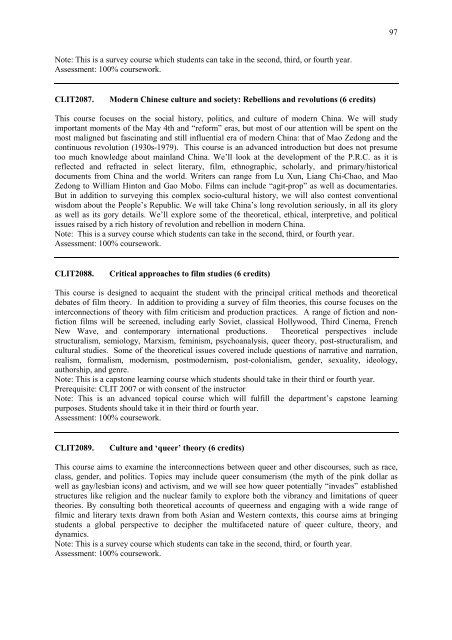(BA) (4-year-programme) - The University of Hong Kong
(BA) (4-year-programme) - The University of Hong Kong
(BA) (4-year-programme) - The University of Hong Kong
Create successful ePaper yourself
Turn your PDF publications into a flip-book with our unique Google optimized e-Paper software.
97Note: This is a survey course which students can take in the second, third, or fourth <strong>year</strong>.Assessment: 100% coursework.CLIT2087.Modern Chinese culture and society: Rebellions and revolutions (6 credits)This course focuses on the social history, politics, and culture <strong>of</strong> modern China. We will studyimportant moments <strong>of</strong> the May 4th and “reform” eras, but most <strong>of</strong> our attention will be spent on themost maligned but fascinating and still influential era <strong>of</strong> modern China: that <strong>of</strong> Mao Zedong and thecontinuous revolution (1930s-1979). This course is an advanced introduction but does not presumetoo much knowledge about mainland China. We’ll look at the development <strong>of</strong> the P.R.C. as it isreflected and refracted in select literary, film, ethnographic, scholarly, and primary/historicaldocuments from China and the world. Writers can range from Lu Xun, Liang Chi-Chao, and MaoZedong to William Hinton and Gao Mobo. Films can include “agit-prop” as well as documentaries.But in addition to surveying this complex socio-cultural history, we will also contest conventionalwisdom about the People’s Republic. We will take China’s long revolution seriously, in all its gloryas well as its gory details. We’ll explore some <strong>of</strong> the theoretical, ethical, interpretive, and politicalissues raised by a rich history <strong>of</strong> revolution and rebellion in modern China.Note: This is a survey course which students can take in the second, third, or fourth <strong>year</strong>.Assessment: 100% coursework.CLIT2088.Critical approaches to film studies (6 credits)This course is designed to acquaint the student with the principal critical methods and theoreticaldebates <strong>of</strong> film theory. In addition to providing a survey <strong>of</strong> film theories, this course focuses on theinterconnections <strong>of</strong> theory with film criticism and production practices. A range <strong>of</strong> fiction and nonfictionfilms will be screened, including early Soviet, classical Hollywood, Third Cinema, FrenchNew Wave, and contemporary international productions. <strong>The</strong>oretical perspectives includestructuralism, semiology, Marxism, feminism, psychoanalysis, queer theory, post-structuralism, andcultural studies. Some <strong>of</strong> the theoretical issues covered include questions <strong>of</strong> narrative and narration,realism, formalism, modernism, postmodernism, post-colonialism, gender, sexuality, ideology,authorship, and genre.Note: This is a capstone learning course which students should take in their third or fourth <strong>year</strong>.Prerequisite: CLIT 2007 or with consent <strong>of</strong> the instructorNote: This is an advanced topical course which will fulfill the department’s capstone learningpurposes. Students should take it in their third or fourth <strong>year</strong>.Assessment: 100% coursework.CLIT2089.Culture and ‘queer’ theory (6 credits)This course aims to examine the interconnections between queer and other discourses, such as race,class, gender, and politics. Topics may include queer consumerism (the myth <strong>of</strong> the pink dollar aswell as gay/lesbian icons) and activism, and we will see how queer potentially “invades” establishedstructures like religion and the nuclear family to explore both the vibrancy and limitations <strong>of</strong> queertheories. By consulting both theoretical accounts <strong>of</strong> queerness and engaging with a wide range <strong>of</strong>filmic and literary texts drawn from both Asian and Western contexts, this course aims at bringingstudents a global perspective to decipher the multifaceted nature <strong>of</strong> queer culture, theory, anddynamics.Note: This is a survey course which students can take in the second, third, or fourth <strong>year</strong>.Assessment: 100% coursework.
















